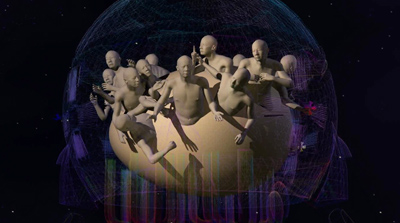A wonderful exhibition at the famous ZKM Centre for Art and Media, Karlsruhe/Germany!
February 9–August 4, 2013
Move on Asia
Video Art in Asia 2002 to 2012

Image: Miao Xiaochun
An exhibition at the ZKM | Media Museum
Opening: Fri, February 8, 2013, 7 p.m., ZKM_Foyer
„The ZKM shows the development of precisely this genre, and points to the increasing significance of Asia in global contemporary art.“
„Until the turn of the century, as an art genre the video continued to be attributed to the western hemisphere – and in spite of the fact that its most important representatives were from Asia; over the last two decades, however, independent video cultures have evolved that have found a global public last but not least at flourishing biennales and art exhibitions throughout the Asian continent.“
„It is not the adherence and conservation of past values, but the recovery, creation, integration and transformation which constitute the guidelines under which the new Asiatic art liberates itself from the western models and achieves an increasingly greater independence.“
I really appreciate that exhibitions at the ZKM regularly think outside the box of Western Art and equally display art works from around the globe!
This time featuring artists from Mainland China, Hong Kong, Japan, India, Indonesia, Republic of Korea, Pakistan, Philippines, Singapore, Sri Lanka, Thailand, Taiwan, Thailand, and Vietnam.
Notes on Photography & Video Art in China
Part of my master thesis in art history was dedicated to doing research on the history of art photography in China.
Photography has been present in China since the middle of the 19th century but usually in a marginalised, purely documentary and often political role. Until the beginning of the 1990s, with rare exceptions such as the work of Long Chin San, photography was simply not present as an art form. Only in the early 1990s did photography and video finally find their way into artistic work and begin to gain acceptance as an independent genre within the visual arts.
In China, the 1990s brought quite a lot different developments socially: the development of the concept of consumerism, the increased presence of mass media, increasing availability of the internet and digital media in general as well as the corresponding technologies.
The quasi reappearance, as it were, of photography at this time ensued almost exclusively in the digital form, and video technology and multimedia art appeared more or less simultaneously. In the field of art, photography had to reinvent itself as it still carried the burden of its decades-long historical-political and purely documentary past. Therefore these new beginnings of photography were based firstly in its potential use as an aid for other artistic means of expression, namely in accompanying and documenting predominantly ephemeral work like performances, particularly those in Beijing´s East Village.
With almost no connection to traditional art history in China, photography – and in this wake also video and digital art – was not bound to traditional styles or pictorial inventions thus enabling an autonomous development within the art context. Hence, these new media were able to bring forth completely new means of expression, making possible a new visual language outside of the traditional aesthetic experiences.
Further bits:
ZKM Centre for Art and Media, Karlsruhe/Germany: Move on Asia. Video Art in Asia 2002 – 2012, until August 4th, 2013.
Previous posts on contemporary photography & digital art:
Me, Myself and I.
Invisible in Vienna.
Pictorial City.
